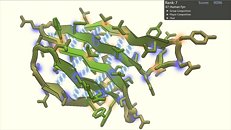qubit
Overclocked quantum bit
- Joined
- Dec 6, 2007
- Messages
- 17,865 (2.81/day)
- Location
- Quantum Well UK
| System Name | Quantumville™ |
|---|---|
| Processor | Intel Core i7-2700K @ 4GHz |
| Motherboard | Asus P8Z68-V PRO/GEN3 |
| Cooling | Noctua NH-D14 |
| Memory | 16GB (2 x 8GB Corsair Vengeance Black DDR3 PC3-12800 C9 1600MHz) |
| Video Card(s) | MSI RTX 2080 SUPER Gaming X Trio |
| Storage | Samsung 850 Pro 256GB | WD Black 4TB | WD Blue 6TB |
| Display(s) | ASUS ROG Strix XG27UQR (4K, 144Hz, G-SYNC compatible) | Asus MG28UQ (4K, 60Hz, FreeSync compatible) |
| Case | Cooler Master HAF 922 |
| Audio Device(s) | Creative Sound Blaster X-Fi Fatal1ty PCIe |
| Power Supply | Corsair AX1600i |
| Mouse | Microsoft Intellimouse Pro - Black Shadow |
| Keyboard | Yes |
| Software | Windows 10 Pro 64-bit |
An AIDS protein folding puzzle has stumped scientists for a decade, but US gamers cracked it in a mere three weeks! This was achieved by combining the brute force logic and speed of the digital computer, with the lateral thinking of the distinctly fuzzy human brain. To achieve this, a distributed computing application called Foldit was used, which involved gamers solving individual puzzles in a competitive atmosphere. This amazing merger of minds and machine over the internet creates a sort of distributed "cybernetic organism", which combines the strengths of biological and silicon computers into something far more powerful than either alone.

The puzzles are that of protein folding, which is highly complex. So much so in fact, that even supercomputers find them tough to chew through, which is why the Stanford Folding@Home project was started a decade ago. The application transforms science problems into three dimensional puzzle challenges for gamers to solve. Within days, a workable model emerged from the challenges, which theboffins scientists were able to refine further into an accurate model of the enzyme's structure. This knowledge opens doors for scientists to design drugs that are effective at stopping HIV from multiplying.
Seth Cooper, a co-creator of Foldit, said:
View at TechPowerUp Main Site

The puzzles are that of protein folding, which is highly complex. So much so in fact, that even supercomputers find them tough to chew through, which is why the Stanford Folding@Home project was started a decade ago. The application transforms science problems into three dimensional puzzle challenges for gamers to solve. Within days, a workable model emerged from the challenges, which the
Seth Cooper, a co-creator of Foldit, said:
People have spatial reasoning skills, something computers are not yet good at. Games provide a framework for bringing together the strengths of computers and humans. The results in this week's paper show that gaming, science and computation can be combined to make advances that were not possible before.
View at TechPowerUp Main Site






 Things suchas this great achievement could bring alot new "gamers" into foldit, keep it up indeed
Things suchas this great achievement could bring alot new "gamers" into foldit, keep it up indeed


